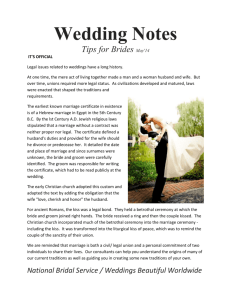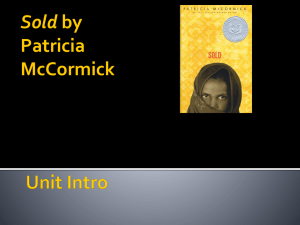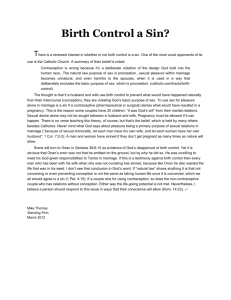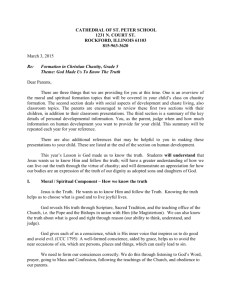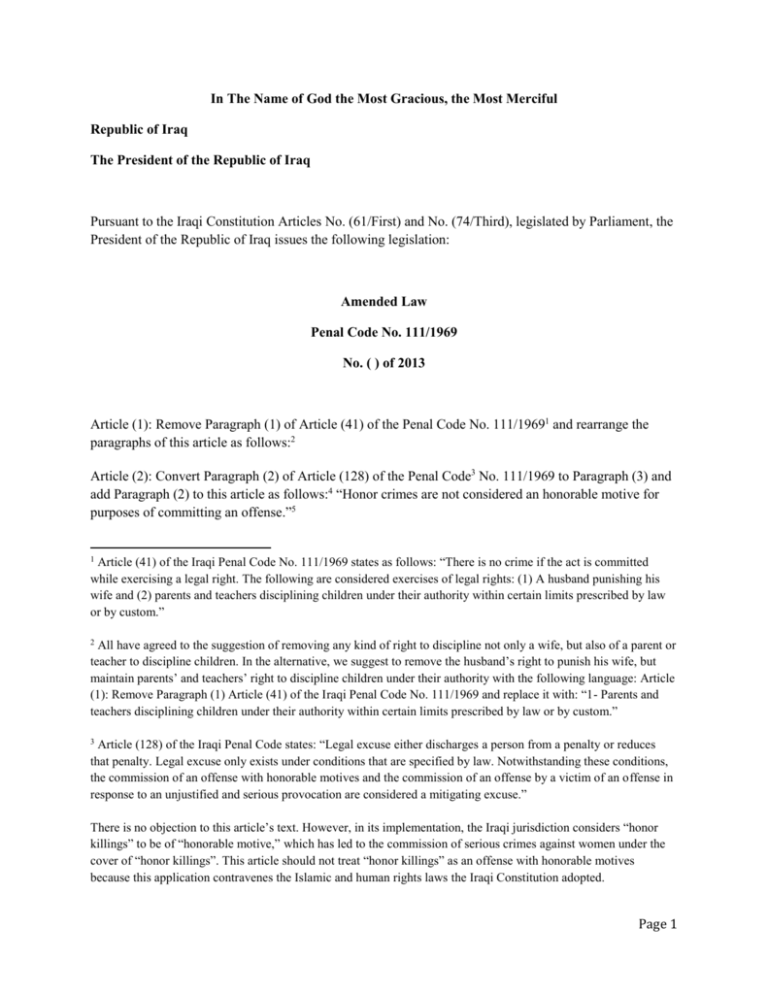
In The Name of God the Most Gracious, the Most Merciful
Republic of Iraq
The President of the Republic of Iraq
Pursuant to the Iraqi Constitution Articles No. (61/First) and No. (74/Third), legislated by Parliament, the
President of the Republic of Iraq issues the following legislation:
Amended Law
Penal Code No. 111/1969
No. ( ) of 2013
Article (1): Remove Paragraph (1) of Article (41) of the Penal Code No. 111/19691 and rearrange the
paragraphs of this article as follows:2
Article (2): Convert Paragraph (2) of Article (128) of the Penal Code3 No. 111/1969 to Paragraph (3) and
add Paragraph (2) to this article as follows:4 “Honor crimes are not considered an honorable motive for
purposes of committing an offense.”5
Article (41) of the Iraqi Penal Code No. 111/1969 states as follows: “There is no crime if the act is committed
while exercising a legal right. The following are considered exercises of legal rights: (1) A husband punishing his
wife and (2) parents and teachers disciplining children under their authority within certain limits prescribed by law
or by custom.”
1
2
All have agreed to the suggestion of removing any kind of right to discipline not only a wife, but also of a parent or
teacher to discipline children. In the alternative, we suggest to remove the husband’s right to punish his wife, but
maintain parents’ and teachers’ right to discipline children under their authority with the following language: Article
(1): Remove Paragraph (1) Article (41) of the Iraqi Penal Code No. 111/1969 and replace it with: “1- Parents and
teachers disciplining children under their authority within certain limits prescribed by law or by custom.”
Article (128) of the Iraqi Penal Code states: “Legal excuse either discharges a person from a penalty or reduces
that penalty. Legal excuse only exists under conditions that are specified by law. Notwithstanding these conditions,
the commission of an offense with honorable motives and the commission of an offense by a victim of an offense in
response to an unjustified and serious provocation are considered a mitigating excuse.”
3
There is no objection to this article’s text. However, in its implementation, the Iraqi jurisdiction considers “honor
killings” to be of “honorable motive,” which has led to the commission of serious crimes against women under the
cover of “honor killings”. This article should not treat “honor killings” as an offense with honorable motives
because this application contravenes the Islamic and human rights laws the Iraqi Constitution adopted.
Page 1
Article (3): Amend Article No. (380) of the Iraqi Penal Code6 as follows: “Any husband who incites his
wife or his kinship to commit adultery is punishable by detention and a fine no less than five million
dinars but not to exceed one hundred million dinars.”7
Article (4): Amend Article No. (409) of the Iraqi Penal Code8 as follows: “Any husband who finds his
wife in the act of adultery or sharing a bed with her lover and either (1) kills one or both of them, (2)
attempts to kill one or both of them, or (3) assaults one or both of them such that he or she dies or is left
permanently disabled, is punishable by:9
1- Imprisonment for a period no less than ten years, if he kills one or both of them;
2- Imprisonment for a period not exceeding seven years, if he (1) attempts to kill one or both of
them or (2) assaults one or both of them, such that he or she dies; or
3- Imprisonment for a period no less than three years, if he assaults one or both of them such that
one or both of them is left permanently disabled.”
The Kurdistan region adopted another solution mentioned in Article No. 14/2002, stating that “For the purposes of
Articles No. (128, 130, and 131) of the Iraqi Penal Code No. 111/1969, the commission of an offense with
honorable motives will not reduce the penalty as a legal excuse.”
4
We suggest to add a new paragraph to Article No. (128) of the Iraqi Penal Code as follows: “For the purposes of
Articles No. (128, 130, and 131) of the Iraqi Penal Code No. 111/1969, the commission of an honor killing does not
have honorable motives.”
5
Article No. (380) of the Iraqi Penal Code states, “Any husband who incites his wife to commit adultery, and she
does so on the basis of such incitement, is punishable by detention.” This article fails to (i) punish the husband for
inciting his wife to commit adultery when the wife does not actually commit the adulterous act; and (ii) mention the
husband inciting his kinship to commit adultery.
6
7
Usually, when a husband incites his wife to commit adultery, he does so for economic reasons, i.e., to obtain
money. Accordingly, the punishment should include not only detention, but also a fine.
Article No. (409) of the Iraqi Penal Code states, “Any person who finds his wife in the act of adultery or finds his
kinship in bed with her lover and kills one or both immediately, or assaults one of them such that he or she dies, or is
left permanently disabled, is punishable by a period of detention not to exceed three years. It is not permissible to
exercise the right of legal defense against any person who uses this excuse nor do the rules of aggravating
circumstance apply against any person who uses this excuse.”
8
9
Suggested amendments: (i) This article should apply exclusively to husbands and wives, i.e., kinship should be
excluded from this article; (ii) with respect to reducing the penalty, husbands and wives should be treated equally
where the same act is committed; (iii) the new amendment added “attempts to kill” to the acts listed in this article;
and (iv) according to the new amendments, the severity of punishments should increase according to the severity of
the criminal act and the harm resulting therefrom.
Page 2
In the Name of God the Most Gracious, the Most Merciful
Republic of Iraq
The President of the Republic of Iraq
Pursuant to the Iraqi Constitution Articles No. (61/First) and No. (74/Third), legislated by Parliament, the
President of the Republic of Iraq issues the following legislation:
Amended Law
Personal Status Law No. 188/1959
No. ( ) of 2013
Article (1): Remove Article No. (10) from the Personal Status Law No. 188/1959,10 and replace it with:
“Article (10):
1. The marriage contract must be registered in a special record in the office of an authorized
marriage registrar and must be signed by the spouses, two witnesses, and the authorized marriage
registrar. The spouses shall be provided with the original copy of the marriage contract.
Article (10) of the Personal Status Law No. 188 of 1959 states, “The marriage contract should be registered in a
special record of the corresponding court, without paying any fees, and in accordance with the following conditions:
10
1- The applicants must submit a letter stating the identity of the two parties to the contract, their age, the
amount of the dowry, and the absence of any legal impediment to the marriage. This document must be
signed by the two contracting parties and certified either by the (Mukhtar) mayor of the district or village,
or by two individuals revered by the district’s citizens.
2- The document must be supplemented by a medical report confirming the two spouses are free from
communicable diseases and health impediments, in addition to other documents required by law.
3- The text of the documents must be written in the registrar’s office and signed, either through a written
signature or a thumbprint, by the two parties to the contract in the presence of the judge who will certify the
marriage thereafter and provide the spouses with the marriage evidence (Hujja).
4- The content of the documents is in full effect once they are duly registered. In addition, they are controlling
in all matters concerning the dowry, as long as they are not subject to any objection before the
corresponding courts.
5- Any man who executes his marriage contract outside the court is punishable by detention for a period no
less than six months and not to exceed one year, or a fine no less than three hundred dinars and not to
exceed one thousand dinars. If a man executes another marriage outside the court when he is already
married, the man is punishable by imprisonment for no less than three years and not to exceed five years.”
Page 3
2. The authorized marriage registrar’s office shall not register the marriage contract until both
spouses provide a medical report confirming both are free from communicable diseases and
health impediments.
3. The authorized marriage registrar’s office shall submit all registered contracts to the Ministry of
Justice for archiving and authentication within seven days from the date of registration.
4. Upon request, the Ministry of Justice shall provide spouses, official entities, and whomever it
may concern with a certified copy of the marriage contract. A marriage contract executed in an
authorized marriage registrar’s office shall be sufficient proof of the marriage in question, unless
a final judgment was issued against its validation or for its forgery. However, the dowry shall
remain applicable regardless of any adverse judgments as to the validation or forgery of the
marriage contract.
5. The authorized marriage registrar shall not register a marriage contract if the law requires a
special approval for the marriage. If special approval is necessary, a competent court, in
accordance with the provisions of the law requiring said approval, must issue the approval. Only
then can the authorized marriage registrar proceed with registering the marriage contract.
6. Any person who executes his marriage contract outside the authorized marriage registrar’s office
is punishable by detention of no less than three months and/or a fine no less than five million
dinars, but not exceeding ten million dinars. If any person concludes his marriage outside the
authorized marriage registrar’s office and is already married, then he is punishable by detention
for a period not to exceed six months and/or a fine no less than ten million dinars, but not
exceeding twenty-five million dinars.
7. Any authorized marriage registrar who either executes a marriage contract knowing that it is
invalid for any legal or religious reason or executes a marriage contract requiring a court approval
before it is approved, is punishable by detention for a period no less than three months and/or a
fine no less than ten million dinars, but not exceeding twenty-five million dinars.
8. The Ministry of Justice is authorized to issue licenses for a marriage registrar’s office according
to the terms, provisions, and rules regulated by the instructions issued by the Minister of Justice
in coordination with the State Consultative Council and the concerned civil organizations.
Licenses for marriage registrar’s offices shall be provided only to Category “C” lawyers who
have passed training courses and competitive exams as determined by the instructions issued by
the Minister of Justice.”11
11
We suggest this replacement for the following reasons:
1- There is corruption in the marriage contracts registration process in the courts.
2- The judges in the courts have numerous other responsibilities; negatively impacting the time judges can
allot to the execution of marriage contracts. We should alleviate judges from such responsibilities and
allow them to proceed with other types of cases.
3- Contract authentication is a duty for notaries rather than courts, while the main function of the latter is to
settle disputes.
The concept of using an authorized marriage registrar is a step toward using private notaries rather than
governmental notaries, who feel incompetent and unable to accomplish his/her duties within a reasonable period of
time due to corruption and routine procedures. In addition, contract authentication a responsibility for notaries
because authentication of a contract does not settle its disputes. Accordingly, the Ministry of Justice thinks it is
Page 4
Article (2): Remove Paragraph (5) of Article 25 of this law,12 and we suggest the following paragraph:
“Either spouse can request for separation from the other after obtaining a judgment of recalcitrance that is
determinative, and the court must respond to the request. If the separation occurred before sexual
intercourse, the wife shall return the received dowry and will lose her deferred dowry. However, if the
separation occurred after sexual intercourse, the wife will return half of the received dowry and will lose
her deferred dowry.”
Article (3): Remove Section (3) titled, “Voluntary Separation (Khula),”13 from Chapter (4) titled, “The
Dissolution of Marriage,” of this law, and replace it as follows:
better to associate this issue with the Department of Notaries as opposed to linking it within the jurisdiction of the
Supreme Judicial Council. Moreover, the suggested amendment does not change the current legal arrangement for
marriage contracts; rather, it retains the same conditions and provisions for providing medical reports, obtaining
permission for the marriage of minors, restrictions on polygamy, and other provisions. For the aforementioned
reasons, we suggest the marital contracts be authenticated private sector notaries rather than by the courts.
Article (25/5) of this law states, “(A) The wife has the right to request for separation two years from the date of
obtaining a judgment of recalcitrance that is determinative, and the court must respond to this request. Pursuant to
her request, the wife will lose her deferred dowry and, if she received her entire dowry, she will be obligated to
return half of what she received. (B) The husband has the right to request for separation after obtaining a judgment
of recalcitrance that is determinative, and the court must respond to this request. Pursuant to his request, the wife
shall return what she received of her dowry, and she will lose her deferred dowry, if the separation happened before
sexual intercourse. However, if the separation happened after sexual intercourse, she will not receive her deferred
dowry and she shall return half of what she received from the entire dowry.”
12
The current law, according to Paragraph B in Article (25/5), distinguishes between the husband and wife in the
timing of their request for separation after the issuance of the judgment of recalcitrance, thus allowing the husband
to request separation immediately after obtaining a determinative judgment of recalcitrance (as mentioned in
Paragraph B), yet forcing the wife (as mentioned in Paragraph A) to wait an additional two years by allowing her to
request separation two years from the date of obtaining the judgment of recalcitrance that is of deterministic nature.
In our suggested amendment, we aim to achieve equal treatment between both spouses in their request for separation
immediately after obtaining a determinative judgment of recalcitrance.
Article (46) states: “1- (Khula) Voluntary Separation severs the bond of marriage through the wife’s
pronunciation of the word (Khula) before a judge or an alternative word with the same meaning. Voluntary
Separation is to be carried out before a judge through an offer and acceptance and is subject to the provisions of
Article (39) of this law. 2- For the (Khula) to be valid, the husband must be qualified to divorce his wife and the
latter must be worthy of it. The (Khula) is considered an irrevocable divorce. 3- The husband may divorce his wife
through the process of (Khula) in exchange for monetary compensation, which may be more or less than her
dowry.”
13
This article adopts the (Khula) type of voluntary separation, which requires the spouses to agree to separate
voluntarily through a contract signed by both spouses resulting in a husband divorcing his wife by way of waiving
some or all of her rights. In contrast, there is a second type of voluntary separation that has been adopted in many
different jurisdictions such as Jordan and Egypt. This latter type of voluntary separation forces the husband to
divorce his wife upon her request. According to Prophet Mohammed’s speech, when a woman does not like her
husband, he may order her to return his garden, but must divorce her in the meantime.
Page 5
Section (3)
Compulsory Separation (Khula)14
Article (46):
1- Compulsory separation severs the bond of marriage either through the consent of both
spouses or through a judge order pursuant to the wife’s request. In return for the severed
bond of marriage, monetary compensation is agreed upon by both parties or is determined
by the law. The (Khula) is an irrevocable divorce.
2- The spouses may separate consensually. In this case, the consensual separation is to be
carried out before a judge through an offer and an acceptance by both spouses.
3- In the case of nonconsensual separation, the wife has the right to ask for separation by
filing a lawsuit, however she must compensate her husband by waiving all financial and
legal rights she gained from him, including her deferred dowry, the received dowry, and
her alimony. The court must order her husband to divorce her, regardless of the
husband’s satisfaction.15
Article (4): Remove Paragraph (1) of Article (74) of this law16, and replace it with the following
paragraph:
“Article (74): If a child, male or female, dies before his father or mother, he shall be treated as
alive upon the subsequent death of his father or mother. His share of the legacy shall be handed
14
In accordance with the suggested amendment, the title of this section has been changed from Voluntary
Separation (Khula) to Compulsory Separation (Khula) because the current title, Voluntary Separation, contravenes
the substantive text of the suggested amendment. The suggested amendment forces the husband to divorce his wife
upon her request and thus is not of voluntary nature and is instead compulsory. The same conflict occurred in the
Kurdistan region when, as a part of their jurisprudence to diminish the effectiveness of compulsory separation laws,
Kurdish legislators adopted the substantive rules of compulsory separation yet kept the title as (Khula) Voluntary
Separation.
15
The drafting of this article is based on the best solutions found in our current Personal Status Law, the Kurdistan
Personal Status Law Amendment No. 15 of 2008, and the Egyptian Personal Status Law No. 1 of 2000.
16
Article (74) of the Personal Status Law states, “1- If a child, male or female, dies before his father or mother, he
shall be treated as alive upon the subsequent death of his father or mother. His share of the legacy shall be handed
down to his own children, male or female, in accordance with Shari’a law (Islamic law). This shall be treated as a
binding will, provided it does not exceed one third of the legacy. 2- The binding will, by virtue of Paragraph (1) of
this Article, shall gain priority over other wills for purposes of the settlement of one-third of the will.”
The amended article has been added pursuant to the Third Amendment of the Personal Status Law No. (72) of 1979,
which states the deceased child’s share from the legacy will transfer to his own children only as binding will,
excluding his mother and wife despite their shares in his legacy.
Page 6
down to his mother17, his widow,18 and his children, males or females, according to Shari’a law
(Islamic law). It shall be treated as a binding will, provided it does not exceed one-third of the
legacy.”
Article (5): Add the following text to Article (74) of the Personal Status Law:
“The deceased child’s mother shall not collect both her shares of the legacy as the deceased’s
mother and her shares from another binding will.”
Labor Law Amendment
The following texts shall be added to the Labor Law:
First Text- The following text shall be added to the “Purpose” or “Main Principles” section of the
Labor Law: “The worker has a right to obtain work without being exposed to sexual harassment
crimes. The employer shall provide effective measures to prevent these types of crimes.”
Second text“First: Any person who commits sexual harassment in the workplace is punishable by detention
for a period not to exceed three years and no less than three months, and/or a fine of no less than
five million dinars.
Second: Sexual Harassment is defined as any sexual conduct undesired by the receiving party19.
It is committed to insult, disturb, as an indecent assault, to surround him or her with an
aggressive work environment, to affect his or her effectiveness by letting him or her work under
pressure, to motivate him or her to provide sexual services, or to resign from work by any way or
means.
However, the deceased child’s mother may not receive her shares from the legacy if she was divorced before her
child’s death.
17
We use the term “widow” in place of “wife” so as to not include the deceased son’s wife in the binding will if she
marries after her husband’s death.
19
The phrase “undesired by the receiving party” is an element of sexual harassment present in all legal systems of
the world. For conduct to be classified as sexual harassment it must be undesired by the receiving party; conversely,
conduct is not classified as sexual harassment if the receiving party desires it for any reason. Without this sentence,
the law will include far too many acts as crimes. For this reason, the amended text excludes conduct that occurs with
the consent of both parties from sexual harassment, which is also in agreement with current Iraqi law, stating sexual
conduct between consenting adults is not a crime.
18
Page 7
In the Name of God the Most Gracious, the Most Merciful
Republic of Iraq
The President of the Republic of Iraq
Pursuant to the Iraqi Constitution Articles No. (61/First) and No. (74/Third), legislated by
Parliament, the President of the Republic of Iraq issues the following legislation:
Amended Law
Social Welfare Act No. 126 of 1980
No. ( ) of 2013
Article (1): Amend Article No. (29) of the Social Welfare Act No. 126/1980 as follows:
“First: The main goals of state dwellings are (1) to provide welfare for children, kids, and
juveniles who do not have a surviving father, and for women who cannot find a suitable and safe
dwelling, (2) to provide the aforementioned individuals a healthy environment so as to
compensate them from their loss of welfare and family companionship, and (3) to prevent the
aforementioned individuals from feeling they live lower standards than others.20
Second: State dwellings shall provide the children, kids, juveniles, and women who can’t find a
suitable and safe dwelling all necessities per diem and free of charge. These provisions shall
include a dwelling, clothing, and food in accordance with instructions issued by the President of
the Public Institution for Public Welfare.”
Article (2): Amend Article No. (31) of this law as follows:
“First: State dwellings shall receive males under the age of eighteen and females under the age of
twenty-five.21
Second: The State shall not force adult males or females to enter or remain in the state dwellings
mentioned in this law.”22
We suggest adding “Women who cannot find a suitable and safe dwelling” to Article No. (1), so as to accept
women into state welfare after they reach the age of 18 and cannot find a suitable dwelling or have lost it for any
reason.
20
The current status: (The state dwellings receive any child under the age of 18 years and doesn’t have survive
father.)
21
Page 8
Article (3): Amend Article No. (32) of this law as follows:
“There are four types of the state dwellings:
First: State dwellings for children under the age of five (5).
Second: State dwellings for kids between the ages of five (5) and thirteen (12).
Third: State dwellings for juveniles between the ages of thirteen (13) and nineteen (18).
However, juveniles may extend their residency in state dwellings for an additional year if he or
she is a high school senior.
Forth: Women’s Centers for women who cannot find a safe and suitable dwelling. These state
dwellings are meant to provide women with welfare, a dwelling, to rehabilitate them, help find
them suitable jobs, and provide them with social, educational and entertainment services.”23
22
We added this text in light of human rights so as to prohibit forcing any person, male or female, regardless of the
reason, to enter or remain in a state dwelling, as long as the said individual does not commit a crime or any act
against the law. Accordingly, the said individual can determine for himself whether he needs to stay in a state
dwelling or not.
The current article only mentions the first three types of state dwellings. Thus, we added the forth type, Women’s
Centers, to mention the State’s new mission towards women who can’t find dwellings.
23
Page 9


